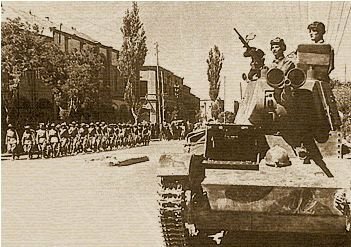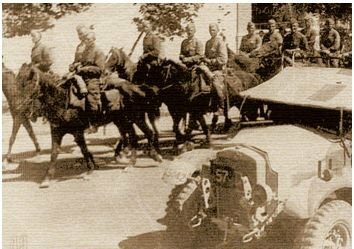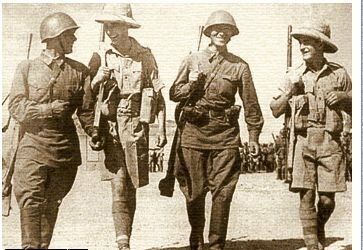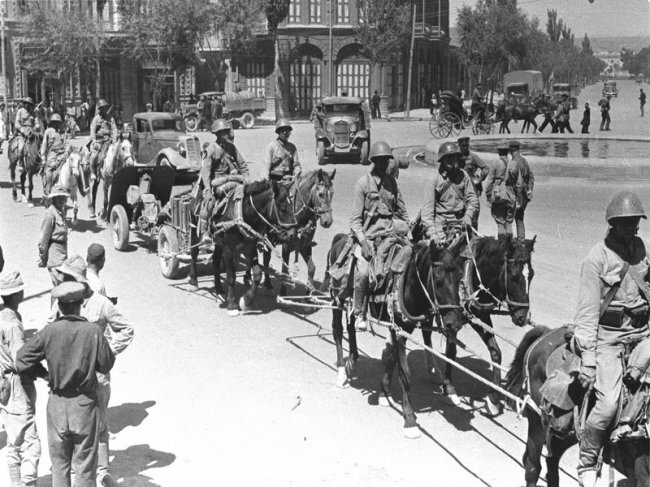Anglo-Soviet occupation of Iran
В stories The Second World War, there are still many pages that, unlike the Battle of Stalingrad or the Allied landings in Normandy, are little known to the general public. These include the joint Anglo-Soviet operation to occupy Iran under the code name "Operation" Sympathy "."
It took place from August 25 to September 17 of the year 1941. Its goal was to protect the Iranian oil fields and fields from possible seizure by German forces and their allies, as well as to protect the transport corridor (the southern corridor), on which the Allies supplied Lend-Lease supplies for the Soviet Union. In addition, Britain feared for its position in southern Iran, especially for the oil fields of the Anglo-Iranian oil company, and was concerned that Germany would be able to penetrate India through India and other Asian countries that were in British influence.
It must be said that this was one of the few successful operations of the Red Army against the backdrop of the dramatic events of the summer of 1941 on the Soviet-German front. Three combined arms armies were used to carry it out, (the 44th, under the command of Major General A. A. Hadeev, 47th, under the command of Major General V.V. Novikov and the 53rd Separate Central Asian Army, under the command of General Lieutenant S. G. Trofimenko) significant forces aviation and the Caspian flotilla.
It should be noted that this operation was the first joint military action of the countries that, due to the changed geopolitical conditions, moved from many years of confrontation to cooperation and became allies in the war with Germany. And the development and implementation by the Soviet and British sides of a joint operation to bring troops into Iran, the implementation of a coordinated policy in the region, became the actual basis for the implementation of closer cooperation in the future, when parts of the American army were introduced into Iran.
The allies, whose interests did not coincide in all, at that moment were striving for one thing: to prevent, first, the threat, and very real, of the pro-German military coup in Iran and the breakthrough of the Wehrmacht forces there; secondly, to ensure the transit through Iranian territory of arms, ammunition, food, medicines, strategic raw materials, fuel and other lend-lease goods needed by the USSR for war and victory, and, thirdly, to achieve the neutrality originally declared by Iran gradually transformed into large-scale cooperation and the transition to the side of the anti-Hitler coalition.
I must say that the influence of Germany in Iran was enormous. With the transformation of the Weimar Republic into the Third Reich, relations with Iran reached a qualitatively different level. Germany began to take part in the modernization of the Iranian economy and infrastructure, the reform of the Shah's army. In Germany, Iranian students and officers were trained, whom Goebbels’s propaganda called as many “sons of Zarathushtra”. The Persians were declared pure-blood Aryans, and a special decree exempted from the Nuremberg racial laws.
In the total trade turnover of Iran in 1940 - 1941, Germany accounted for 45,5 percent, USSR - 11 percent and Britain - 4 percent. Germany firmly infiltrated the Iranian economy, and built relations with it in such a way that Iran practically became a hostage of the Germans and subsidized their ever-increasing military spending.
The volume of German imports to Iran increased rapidly. weapons. In the eight months of 1941, over 11.000 tons of weapons and ammunition were imported there, including thousands of machine guns and dozens of artillery pieces.
With the beginning of World War II and the German attack on the USSR, despite the formal proclamation of neutrality by Iran, the activities of the German intelligence services intensified in the country. With the encouragement of the government led by Reza Shah, who was pro-German, Iran became the main base for German agents in the Middle East. On the territory of the country, reconnaissance and sabotage groups were established, weapons depots were set up, including in the northern regions of Iran bordering the Soviet Union.
Trying to draw Iran into the war against the USSR, Germany offered Reza Shah weapons and financial assistance. And in exchange, she demanded that her “ally” place at her disposal Iranian air bases, to which construction German specialists had a direct relationship. In the case of aggravation of relations with the ruling regime in Iran, a coup d'etat was being prepared. To this end, in early August 1941, the head of the German intelligence, Admiral Canaris, arrived in Teheran under the guise of a representative of a German company. By this time, under the leadership of Major Friesh’s Abwehr officer in Tehran, special combat units were formed from the Germans living in Iran. Together with a group of Iranian officers involved in the conspiracy, they were to form the main strike group of the rebels. The performance was scheduled for August 22 1941 of the year, and then rescheduled for August 28.
Naturally, neither the USSR nor the UK could ignore such a development.
The USSR thrice - 26 June, 19 July and 16 August 1941, warned the Iranian leadership to activate German agents in the country and proposed to expel the territory of all German nationals (among them there were many hundreds of military specialists), since they conduct activities incompatible with Iran’s neutrality . Tehran rejected this request.
He denied the same demand to the British. Meanwhile, the Germans in Iran developed their activity, and the situation became more and more dangerous for the anti-Hitler coalition every day.
25 August morning in the 4 hour 30 minutes the Soviet ambassador and the British envoy jointly visited the Shah and handed him notes of their governments about the entry of Soviet and British troops into Iran.
In the northern provinces of Iran were introduced part of the Red Army. In the southern and south-western - British troops. Within three days, from 29 to 31 in August, both groups reached the pre-planned line, where they merged.
It must be said that the Soviet Union had every legal reason to react decisively to this development along its southern border in accordance with Article VI of the Treaty between the USSR and Persia of February 26 of 1921 of the year. She read:
“Both High Contracting Parties agree that if third countries try to carry out a seizure policy on the territory of Persia by armed intervention or turn the territory of Persia into a base for military actions against Russia, if this threatens the borders of the Russian Of the Federal Socialist Republic or its allied powers, and if the Persian Government, after being warned by the Russian Soviet Government, is not in power itself, To pervert this danger, the Russian Soviet Government will have the right to deploy its troops into Persian territory in order to take the necessary military measures in the interests of self-defense. By eliminating this danger, the Russian Soviet Government is obliged to immediately withdraw its troops from Persia. ”
Soon after the commencement of the entry of allied troops into Iran, there was a change in the cabinet of ministers of the Iranian government. Iran's new prime minister, Ali-Forugi, issued an order to cease resistance, and the next day this order was approved by the Iranian Majlis (parliament). 29 August 1941, the Iranian army laid down arms before the British, and 30 August - before the Red Army.
September 18 1941. Soviet troops entered Tehran. Iranian ruler Reza Shah, in a matter of hours, abdicated the throne in favor of his son, Mohammed Reza Pahlavi, and, along with another son, a staunch supporter of Hitler, fled to the British area of responsibility. Shah was sent first to the island of Mauritius, and then to Johannesburg, where he died three years later.
After the abdication and departure of Reza Shah, his eldest son, Mohammed-Reza, was raised to the throne. Official representatives of Germany and its allies, as well as most of their agents, were interned and deported.
Photos of the Soviet-British invasion of Iran:



29 January 1942 was signed on the Treaty of Union between the USSR, Great Britain and Iran. The Allies pledged to "respect the territorial integrity, sovereignty and political independence of Iran." The USSR and Britain also pledged to "defend Iran with all the means at their disposal against any aggression on the part of Germany or any other power." For this task, the USSR and England received the right to "maintain in the Iranian territory land, sea and air forces in such quantities as they consider necessary." In addition, the Allied states were granted unlimited right to use, maintain, protect, and in the case of military necessity control over all means of communication throughout Iran, including railways, highways and dirt roads, rivers, airfields, ports, etc. Under this agreement, through Iran began to deliver allied military technical cargoes from the ports of the Persian Gulf to the Soviet Union.
Iran, in turn, has committed itself to “cooperate with the Allied states with all the means at its disposal and in all possible ways so that they can fulfill the above obligations”.
The treaty established that the troops of the USSR and Britain should be withdrawn from the territory of Iran not later than six months after the cessation of hostilities between the allied states and Germany and its accomplices. (In 1946, the troops were completely withdrawn). The Allied powers guaranteed Iran that they would not require the participation of its armed forces in military operations, and also pledged at peace conferences not to approve anything that would damage the territorial integrity, sovereignty or political independence of Iran. The presence of allied forces in Iran, the neutralization of German agents (*), the establishment of control over the main communications in the country significantly changed the military-political situation on the Soviet southern frontiers. The threat was removed to the most important oil region, Baku, which produced about three-quarters of all the oil produced in the USSR. In addition, the Allied military presence had a deterrent effect on Turkey. And the Soviet command was able to remove part of the forces from the southern borders and use them on the Soviet-German front. All this testified to the effectiveness of the cooperation of the great powers united in the fight against fascist aggression.
- Vladimir Mayevsky
- http://www.ruvr.ru"rel =" nofollow ">http://www.ruvr.ru

Information